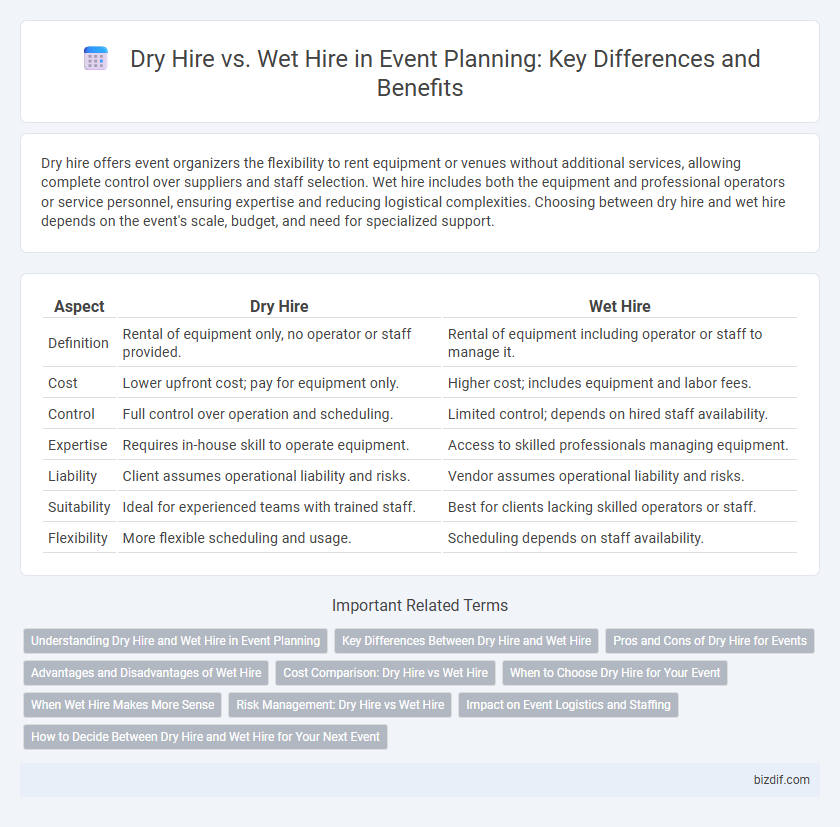Dry hire offers event organizers the flexibility to rent equipment or venues without additional services, allowing complete control over suppliers and staff selection. Wet hire includes both the equipment and professional operators or service personnel, ensuring expertise and reducing logistical complexities. Choosing between dry hire and wet hire depends on the event's scale, budget, and need for specialized support.
Table of Comparison
| Aspect | Dry Hire | Wet Hire |
|---|---|---|
| Definition | Rental of equipment only, no operator or staff provided. | Rental of equipment including operator or staff to manage it. |
| Cost | Lower upfront cost; pay for equipment only. | Higher cost; includes equipment and labor fees. |
| Control | Full control over operation and scheduling. | Limited control; depends on hired staff availability. |
| Expertise | Requires in-house skill to operate equipment. | Access to skilled professionals managing equipment. |
| Liability | Client assumes operational liability and risks. | Vendor assumes operational liability and risks. |
| Suitability | Ideal for experienced teams with trained staff. | Best for clients lacking skilled operators or staff. |
| Flexibility | More flexible scheduling and usage. | Scheduling depends on staff availability. |
Understanding Dry Hire and Wet Hire in Event Planning
Dry hire in event planning refers to renting equipment or venues without any accompanying staff or services, allowing organizers full control over setup and management. Wet hire includes both equipment and qualified personnel, ensuring professional handling and operation during the event. Selecting between dry hire and wet hire depends on the event's complexity, budget, and the planner's capability to manage logistics effectively.
Key Differences Between Dry Hire and Wet Hire
Dry hire involves renting equipment or venues without staff or additional services, placing responsibility for setup and operation on the client, while wet hire includes equipment rental bundled with professional operators and support personnel. Wet hire offers comprehensive event management solutions, ensuring technical expertise and smooth execution, whereas dry hire provides cost savings and flexibility for experienced event planners. Key differences center on service inclusivity, cost structure, and control over event logistics during setup and operation phases.
Pros and Cons of Dry Hire for Events
Dry hire offers significant cost savings by only renting the equipment without additional staff, allowing event organizers full control over setup and operation. Challenges include the necessity for skilled personnel to manage the equipment, increasing the risk of operational errors and potential delays during the event. This option suits experienced planners with access to trained teams but may lead to logistical complications for those lacking technical expertise.
Advantages and Disadvantages of Wet Hire
Wet hire offers event planners the advantage of complete service packages, including equipment, operators, and technical support, ensuring seamless event execution and reducing the need for specialized staff. The main disadvantage lies in higher overall costs compared to dry hire, as clients pay for both equipment rental and skilled labor, which may not be budget-friendly for smaller events. Wet hire can also limit flexibility since clients rely on the provider's schedule and expertise, potentially restricting customization and control over event specifics.
Cost Comparison: Dry Hire vs Wet Hire
Dry hire typically offers a lower upfront cost since it involves renting equipment only, requiring clients to manage setup, operation, and staffing independently. Wet hire includes equipment rental bundled with trained operators or technicians, resulting in higher fees but reducing the need for additional labor expenses and minimizing risk. Choosing between dry hire and wet hire depends on the event's budget, available skilled personnel, and the complexity of technical requirements.
When to Choose Dry Hire for Your Event
Dry hire is ideal for event planners who have a skilled team and want full control over equipment setup and management, enabling customization to specific event requirements. It is cost-effective when you already have access to necessary staff and only need to rent essential equipment such as lighting, sound systems, or staging. Opt for dry hire for corporate events, conferences, or private parties where in-house expertise allows seamless integration of rented assets into the overall event production.
When Wet Hire Makes More Sense
Wet hire makes more sense for complex events requiring professional staff, equipment, and full-service management to ensure seamless execution. It reduces the risk of technical issues and logistical challenges by leveraging expert knowledge and pre-tested resources. This approach is ideal for large-scale corporate functions, weddings, and concerts where coordination and reliability are critical.
Risk Management: Dry Hire vs Wet Hire
Dry hire shifts the responsibility of equipment operation and associated risks onto the event organizer, increasing the need for in-depth staff training and insurance coverage. Wet hire includes qualified operators along with the equipment, reducing operational risks and liabilities for the client. Choosing wet hire enhances safety compliance and minimizes potential legal issues by ensuring expert handling of technical resources.
Impact on Event Logistics and Staffing
Choosing dry hire for event planning places the responsibility of logistics and staffing entirely on the organizer, requiring them to manage equipment transport, setup, and skilled personnel. Wet hire simplifies operations by providing vehicles and operators, reducing the need for additional staffing and ensuring professional handling throughout the event. This distinction significantly impacts resource allocation, operational efficiency, and overall event execution quality.
How to Decide Between Dry Hire and Wet Hire for Your Next Event
Choosing between dry hire and wet hire depends on your event's scope, budget, and required services; dry hire offers equipment rental only, ideal for experienced teams, while wet hire includes professional operators and full service support. Assess your team's expertise and the complexity of event logistics to determine if managing equipment independently (dry hire) or relying on comprehensive service providers (wet hire) best suits your needs. Comparing costs, control level, and risk management helps ensure seamless event execution and optimal resource allocation.
Dry hire vs Wet hire Infographic

 bizdif.com
bizdif.com